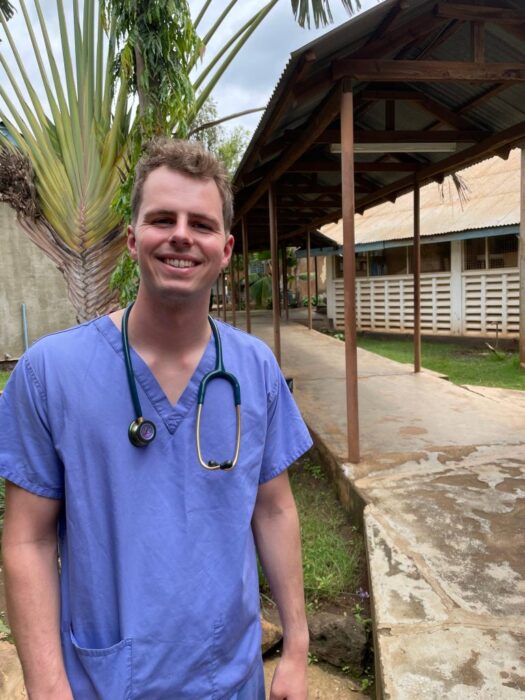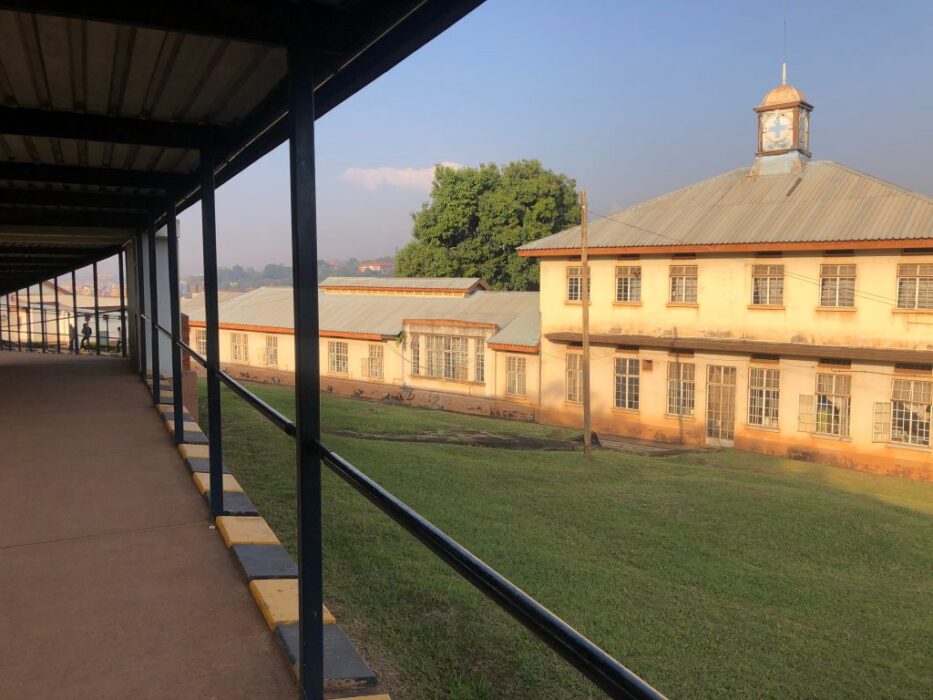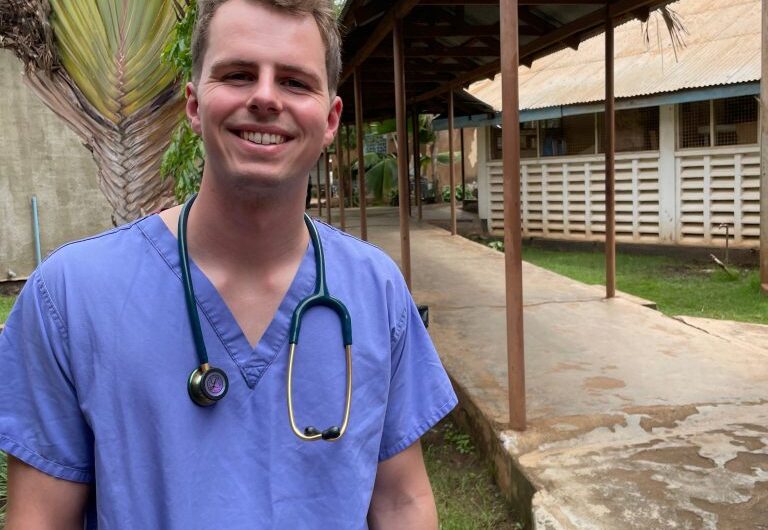By Luke Coakham
Luke Coakham is a third-year graduate medical student at the University of Cambridge in the Anaesthesia Division. For his medical elective, he spent three weeks in Tanzania, and four weeks in Uganda at the Mulago National Referral Hospital, Kampala as part of the SCALE Critical Care project supported by CGHP.
With only 55 critical care beds in a country of over 45 million people, the Strengthening Workforce Capacity through global Learning in Critical Care (SCALE Critical Care) project aims to develop human resource capacity to deliver intensive care at facility level in Uganda, as well as driving health system improvements.
Why did you want to take part in the project?
I wanted to come to somewhere like Uganda for my medical elective because I wanted to experience a healthcare system completely different to our own in the UK. As somebody also interested in critical care and anaesthetics, when I came across the SCALE CGHP project in Uganda it seemed a perfect fit for me! The SCALE project is unique because virtual simulation training in critical care between two countries has not previously been done in Mulago Hospital before. A new simulation suite is being set up to practice simulating clinical scenarios so that staff can be trained in how to manage them. I hoped to observe some of this simulation training and see the equipment being used to help enable the running of virtual joint simulations with Addenbrooke’s Hospital in the future.

What skills were you able to use?
During my elective I spent time in several different hospital departments, including anaesthetics, the emergency department, and ICU (cardiac and general). In these areas I got to practice some clinical skills and history taking, as well as problem solving and administrative skills.
I was also able to observe and help out with a Managing Emergencies in Paediatric Anaesthesia (MEPA) simulation course, a programme originally developed in the UK. It involved a number of different clinical scenarios with pairs of staff members taking turns to be in the ‘hot seat’, leading the medical response. The course gave staff the opportunity to practice giving anaesthetic care in a safe environment, but with some of the time pressure and unpredictability of real clinical care. It was interesting to hear everybody’s reflections after the simulation cases, and everybody clearly took away some very useful learning points.
I think the idea of getting lots of different perspectives from colleagues on how to manage a situation is excellent training for future scenarios with real patients. I’m really happy the training is being expanded and am sure it will benefit patients as well as staff members in the future.
Anaesthetic staff members on the MEPA training course in Mulago Hospital, Kampala. (Photo: Luke Coakham).
What differences did you observe between the Ugandan and UK hospital systems?
The biggest difference I noticed was that patients in Uganda had to pay for lots of healthcare treatment, for example medications, investigations, medical equipment and even wheelchairs to take patient for scans, unlike in the UK. It took me some time to adjust to the sight of patients carrying receipts proving they had paid for certain services before being treated in hospital.
Being a national referral hospital, and the largest public hospital in Uganda, Mulago Hospital receives a very large volume of patients. For many of these patients, the emergency department is their first port of call and as a result the area is very overcrowded. After review by the team, patients are either sent for surgery, or to a different, more suitable department within the hospital. It seemed there were often multiple teams looking after the same patient, for example orthopaedics and neurosurgery.
Resources are also very limited. For example, there is only one machine available in the whole emergency department for taking basic measurements like blood pressure and blood sugar levels, and these measurements need to be taken before any other aspect of patient care, holding everything up. What’s more, the small pins used to prick a patient’s finger when measuring their blood glucose levels often aren’t available, so staff have to use more expensive cannulas to do the same job, ultimately costing the hospital more money. I asked one doctor why equipment was so limited, and she explained that they had previously had more but such things are often stolen to be used in private clinics outside the hospital.
The style of teaching for medical students felt a bit more paternalistic, but the medical students were given much more responsibility and involved more as part of the team than they are in the UK.
“The healthcare staff are incredibly calm and enthusiastic despite the challenging circumstances they’re faced with.”

An older part of Mulago Hospital, Kampala. (Photo: Luke Coakham).
What surprised you?
I was a surprised at how much English was spoken in Uganda, both outside but particularly inside the hospital. Since English is the national language of Uganda, most people I came across spoke very good English. In the hospital, ward rounds and other teaching were conducted in English. I also found that the healthcare staff are incredibly calm and enthusiastic despite the challenging circumstances they’re faced with, and it was incredible to see how resourceful they were with the resources available.
What impact did your visit have for the healthcare service and staff?
I helped to keep the CGHP team in the UK informed regarding updates on the set up of the new simulation lab at Mulago Hospital. I was also able to provide some insight into the difference in healthcare set up between UK and Uganda and had the chance to give some teaching to medical students in the emergency department. I helped share the workload in the emergency department by clerking and examining patients under supervision. I was also able to pay for medical supplies (glucose monitor equipment) for the emergency room and give away some PPE.
Ferguson, a Ugandan medical student who came to Cambridge as part of an exchange programme, came to say goodbye on the day of his induction to start his ‘internship’ after graduating medical school.
What was a highlight of your experience?
One great memory of mine centres around a patient I clerked into the emergency department who had been vomiting for several days. She was brought in by her son, and they had both travelled several hundred miles to the hospital. I was able to arrange investigations such as a CXR and bloods. The patient was then given treatment but showed little improvement and was moved to a different ward. Each day I continued to check on the patient, and she did not improve for several days. However, on my last day in Uganda, I dropped by and was delighted to see her sitting up in bed looking much better, and the son very happy (he had been sleeping on the floor next to his Mum for the past week because he lived in the West of Uganda which was too far and too expensive to travel to). The patient also recognised me and thanked me. It was a very nice end to my time in Uganda to see the patient get better and finally leave the hospital after more than a week as an inpatient.
What’s next?
I had a fantastic time in Uganda and would love to continue to be part of the SCALE Critical Care project, both from the UK and in Uganda. The new simulation suite in Mulago Hospital is still being set up, but once it is set up we will have the opportunity to run joint simulations between the UK and Mulago in Uganda.
The next steps for the project are as follows:
- Development of a curriculum in critical care between Mulago and Cambridge.
- Establishment of a good internet connection in Mulago to use wherever the sim ends up being situated.
- Running of an in-person simulation in the new simulation suite to test out new equipment and audio quality.
- Running of a trial virtual simulation between the two countries.
Read all about Luke’s experience – both inside and outside Mulago Hospital – on his blog
Find out more about the SCALE Critical Care project
Luke’s trip was made possible by funding from the Thriplow Charitable Trust.
The drummers of Burundi, known as the ‘world’s best drummers’ at the Ndere Cultural Centre, Kampala. (Photo: Luke Coakham).
Return to blogs

